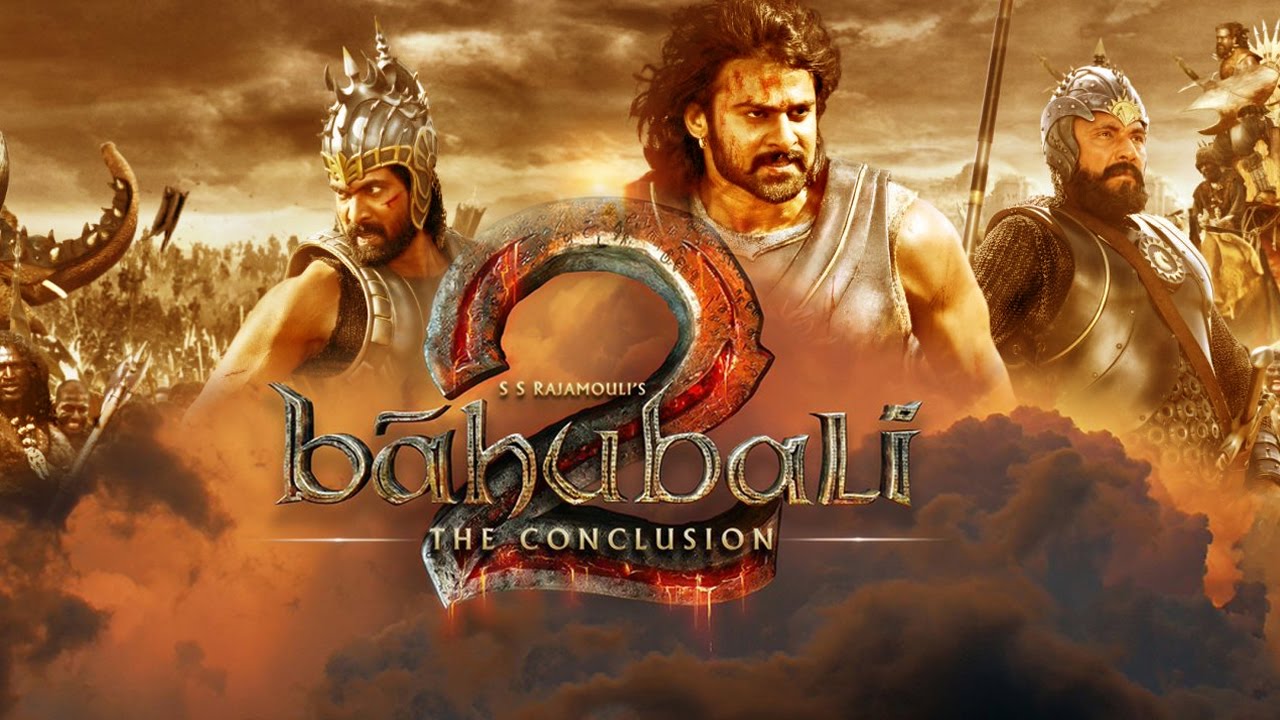By Shritan Varma
Director: S.S. Rajamouli
After a marvellously animated opening credits sequence which serves as a recap of the prequel, we’re once again transported to the enchanting world of Baahubali. The ‘Conclusion’ doesn’t exactly pick up where Rajamouli left us two years ago, that is, the infamous killing of Maahishmati’s rightful heir to the throne.
Instead, we’re thrown into the middle of a whistle-worthy mini action set piece that re-introduces Prabhas’ now- iconic character, as he rescues the Queen Mother, Sivagami from the wrath of a wonderfully detailed CGI Elephant.
A chills-inducing song follows, laced with a montage that displays the elevation of the titular character’s heroism. The story pretty much plays out how you expected from there for the rest of the first half, but it’s executed in such grand fashion that you can’t help but be charmed by Rajamouli’s fairytale-esque storytelling.
Thanks to it’s teaser-like predecessor, the script wastes no time in further character development and simply works with the pre-established bonds between our characters, to create an exciting environment with situations of peril to place the characters in.
The second act is entirely devoted to show the discord, hatred, jealousy and betrayal in the Royal family, and how this dramatic tension causes the crucial events which we’ve only seen a glimpse of in the first film. The romantic sub-plot involving Baahubali and Devasena (Anushka Shetty) in the first half is light-hearted and fun.
There’s also a magically crafted dance sequence set on the sea, replete with Sabu Cyril’s amazing set design and Senthil’s breathtaking cinematography. It’s spell-binding, and offers quite a trippy experience though it doesn’t make much sense. Maybe it isn’t supposed to. The first half ends with a brilliant bang and on a high note, giving you goosebumps for at least four minutes, straight till the Intermission title card appears.
The second half, however, is a rather bumpy ride.
It falls prey to an inconsistent narrative. You almost feel like the film is so hell bent on explaining why Kattappa killed Baahubali, that it’s going to succumb to a half-baked climax.
However, it eventually gets back on track and ends with a larger-than-life war sequence, with a ton of creativity in the battle choreography. I mean seriously, who would have thought of human cannonballs for crying out loud! Prabhas and Rana Daggubati, the two powerhouses of the show, finally go at it, head-to-head in an awe-inspiring royal rumble that makes you wish it was longer.
While the finale is a spectacle full of grandiose, it never feels chaotic or overblown. SS Rajamouli makes more use of his canvas in this one, as we go to new places outside the main kingdom. He has clearly made use of more colours on the palette, as the overhead VFX shots of different locations such as Devasena’s kingdom are vivified and full of gorgeous imagery.
MM Keeravani’s background score is brilliant, too. It kicks in at the right moments and electrifies each and every scene. Three songs in the film stand out and there are plenty of ‘musical throwbacks’ to the previous film.
Prabhas delivers a solid performance here. He’s glorious as Amarendra Baahubali and packs a punch. The intense look in his eyes and physique show that he has been perfectly cast for this saga. His best moment is when he shockingly decapitates a soldier in a court hall, by far my favourite part of the film. Anushka Shetty is impressive, and get’s enough screen-time to be a badass warrior princess. The rest of the cast, despite some bouts of overacting, get a few moments to shine. The chemistry that all the characters share is remarkably thought out and forms the crux of the whole plot.
Everything can’t be gold in a blockbuster though. There a few shots that are poorly edited and look more ridiculous than they must have been on paper. Nasser surprisingly gives the worst performance in the film and is vexatious every time he’s on-screen.
The screenplay could have been much more smoother and more balanced too. 80 percent of the film is a part of the flashback section, and so, a jump to present-day and then directly to the finale feels abrupt. There’s a misplaced and silly comedy track in the first half that could have been reduced to regular banter.
For the action junkies, the war sequences are executed with the right dose of masala and character dynamics,
and have a massive entertainment quotient, while still keeping them original and innovative. In the end, Baahubali can be called a borderline superhero fantasy epic. It has its heart in the right place, too. It’s a strict theatre-only experience that should be enjoyed with a packed hall cheering for the warrior superhero.
Rajamouli has achieved technical brilliance with the best visuals ever put to film in India. Baahubali 2 is a film that will take South Indian cinema as well as Indian cinema as a whole to new heights in a time of big CGI-driven blockbusters. That, in itself, is quite an achievement. It’s a lavishly filmed extravaganza that is ultimately Indian at heart, and will go down in Indian Cinema history not only as an all-time blockbuster, but also as a classic with a little something for everyone to enjoy.
Rating: 3.5/5







Leave A Comment
You must be logged in to post a comment.